#three principles of faith and Islam
Explore tagged Tumblr posts
Text
(New York) – The Chinese government is significantly reducing the number of mosques in Ningxia and Gansu provinces under its “mosque consolidation” policy, in violation of the right to freedom of religion, Human Rights Watch said today.
Chinese authorities have decommissioned, closed down, demolished, and converted mosques for secular use as part of the government’s efforts to restrict the practice of Islam. The authorities have removed Islamic architectural features, such as domes and minarets, from many other mosques.
“The Chinese government is not ‘consolidating’ mosques as it claims, but closing many down in violation of religious freedom,” said Maya Wang, acting China director at Human Rights Watch. “The Chinese government’s closure, destruction, and repurposing of mosques is part of a systematic effort to curb the practice of Islam in China.”
Chinese law allows people to practice only in officially approved places of worship of officially approved religions, and authorities retain strict control over houses of worship. Since 2016, when President Xi Jinping called for the “Sinicization” of religions, which aims to ensure that the Chinese Communist Party (CCP) is the arbiter of people’s spiritual life, state control over religion has strengthened.
“Mosque consolidation”[1] is referenced in an April 2018 central CCP document that outlines a multi-pronged national strategy to “Sinicize” Islam, or make it more Chinese.[2] It instructs the CCP and state agencies throughout the country to “strengthen the standardized management of the construction, renovation and expansion of Islamic religious venues.” The document notes that a central principle behind such “management” is that “there should not be newly built Islamic venues,” in order to “compress the overall number [of mosques].” While there can be exceptions, the document states that “there should be more [mosque] demolitions than constructions.”
Ma Ju, a US-based Hui Muslim activist who has been in contact with Hui in China affected by the policy, told Human Rights Watch that it is part of efforts to “transform” (转化) devout Muslims in order to redirect their loyalty toward the CCP: “Government officials first approach those Communist Party members who are also Hui Muslims … then they move onto ‘persuading’ students and governmental workers, who are threatened with school probation and unemployment if they continue with their faith.”
Available government documents suggest that the Chinese government has been “consolidating” mosques in Ningxia and Gansu provinces, which have the highest Muslim populations in China after Xinjiang.[3] Since 2017, Chinese authorities in Xinjiang have damaged or destroyed two-thirds of the region’s mosques, according to the Australian Strategic Policy Institute (ASPI). About half have been demolished outright.
In Ningxia, Human Rights Watch has verified and analyzed videos and pictures posted online by Hui Muslims and used satellite imagery to corroborate them in order to examine the policy’s implementation in two villages. Of these villages’ seven mosques, four had significant destruction: three main buildings had been razed and the ablution hall of one was damaged inside. The authorities have removed the domes and minarets of all seven mosques.
Human Rights Watch is unable to determine the number of mosques shuttered or repurposed throughout Ningxia and Gansu, as official documents do not give precise details. In a forthcoming research report, two scholars on Hui Muslims, Hannah Theaker and David Stroup, have estimated that one-third of mosques in Ningxia have been closed since 2020.[4] A March 2021 Radio Free Asia report estimated that between 400 and 500 mosques faced closure in Ningxia, which had 4,203 mosques as of 2014.
The Chinese government claims that the mosque consolidation policy aims to “reduce the economic burden” on Muslims, especially those who live in impoverished and rural areas.[5] Actions against mosques often take place as the Chinese government relocates villagers from these areas, consolidating several villages into one.[6] The government also claims that as different Islamic denominations share the same venues, they learn to become more “unified” and “harmonious.”
Some Hui Muslims have publicly opposed the policy, despite government censorship. In January 2021, Ningxia officials indicted five Hui for “creating disturbances” after they led 20 people to oppose the policy at the village Party chief’s office. People have also protested mosque closures and demolitions, as well as the removal of domes and minarets in Ningxia, Gansu and other Hui Muslim regions, such as Qinghai and Yunnan.[7]
Ma Ju told Human Rights Watch that mosque consolidation aims to dissuade people from going to pray at mosques: “After removing the minarets and domes, local governments would start removing things that are essential to religious activities such as ablution halls and preacher’s podiums.”
Ma Ju said the government has sought to discourage religious practice: “When people stop going, they [the authorities] would then use that as an excuse to close the mosques.” He said that the authorities install surveillance systems in the remaining “Sinicized” mosques: “After the mosques are converted, the local governments strictly monitor attendance at the remaining mosques,” he said. “In the beginning, they would check the attendees’ national identification cards. Then they install surveillance cameras … to flag [those prohibited from mosques, including] Communist Party members or children.”
Article 18 of the Universal Declaration of Human Rights provides that “[e]veryone has the right to freedom of thought, conscience and religion.” One has the right to manifest their “religion or belief in teaching, practice, worship and observance.” The Chinese government should reverse its Sinicization campaign on religions, review and repeal laws and regulations that restrict the right to freedom of religion, and release those detained for peaceful criticism or protest against such restrictive policies.
Foreign governments, particularly member countries of the Organization of Islamic Cooperation (OIC), should press the Chinese government to cease their mosque consolidation policy and the broader Sinicization campaign.
“The Chinese government’s policies of Sinicization show a blanket disregard for freedom of religion not only of all Muslims in China, but all religious communities in the country,” Wang said. “Governments concerned about religious freedom should raise these issues directly with the Chinese government and at the United Nations and other international forums.”
93 notes
·
View notes
Text
BENEFITING FROM CONTEMPLATIVE DIALOGUES AND COUNSELS: Part 1
Could you explain the essential principles to be observed in order to benefit from spiritual advice in the best way, with respect to both the speaker and listener?
Nasihah (advice) means living with the idea of doing good to others. The manner of doing good and the relation between the speaker and the listener might show differences according to different persons or societies. Some try to do good to others by counseling, authoring books, preparing brochures, and different other ways as their position and means allow, and thus appeal to their spirit. Spiritual advice is a very important need for everybody, no matter their walk of life. The Qur’an draws attention to this important point with the command, “But remind and warn, for reminding and warning are of benefit to the believers” (adh-Dhariyat 51:55). The act of reminding and warning mentioned in the verse has differing degrees of meaning that refer to faith (iman), Islam, and ihsan, deepening in faith, and inviting someone to comprehend Islam as a whole. The inflection of the original Arabic word (as dhakkara) is noteworthy, for it denotes the significance and continuity of reminding. This form (of taf’il) denotes abundance in quantity. Accordingly, the verse commands continually reminding and giving advice. In other words, do not give up giving advice by saying, “I have said what needs to be told two or three times already, but people keep living in obdurate heedlessness;” instead, keep reminding as a continuous responsibility, for it will definitely be beneficial to believers.
The Messenger of God, peace and blessings be upon him, pointed out this truth with his invaluable words of wisdom that religion is sincere counselling and good advice. Giving advice is an essential aspect of practicing religion in individual and societal level. If this duty is not fulfilled, then the religion is destined to fall, sooner or later. As a matter of fact, the blessed life of God’s Messenger was centered on advice. He would sit at his mosque in Medina at certain times of day, and the Companions formed circles around him. Some would ask questions about worship, some about his statements they could not understand, and some would ask about the meaning of certain verses in the Qur’an. He never turned down any of them. In his entire lifetime, he only retreated to a corner away from his wives at one occasion; no other such case is reported during his mission. He would stay among his Companions, explain verses of the Qur’an, answer their questions, and settle their problems. This is how most of the verbal statements in hadith sources were made. As for his exemplary behavior, recorded in hadith sources as “af’al an-Nabawi,” or “acts of the noble Prophet,” they constituted the practical aspect of his tradition. In addition, his keeping silent before practices he witnessed was taken as “approval,” which constituted another aspect of his Sunnah. In other words, the silence he presented served as a criterion about states and behaviors acceptable in religion. In accordance with that, the Companions decided whether something was acceptable. These were the three ways in which he continuously conveyed what needed to be taught.
Talking according to the needs of listeners
If both the speakers and the listeners are sincere, a question-answer format can make a religious talk more efficient. Otherwise, a speaker who does not take listeners’ feelings and needs into consideration may think he delivers great speeches, but the matters he tells will not be of any permanent benefit for them. For this reason, like a teacher who follows a school curriculum by distributing subjects to different weeks and months, and teaches them gradually in a way to suit the level of the students, a religious instructor must convey what he or she will tell within a gradual plan that suits the capacity and knowledge of their audience; this will help them digest and internalize the issues being told. However, only those who can behold the issue with an overall view can present the subjects like that. As for the topics to be told by those who try to save the day, they will fail to make up a harmonious whole, and thus not yield the desired benefit for the listeners.
In this respect, what the society needs should be determined well. For example, if the Daily Prayers are not observed as they should be, the program needs to have the truth and essence of the Prayers at its core. If the Messenger of God, peace and blessings be upon him, is not properly known in a way that exemplifies his true worth, then he should be introduced with all of his aspects in order to work heartfelt love for him into souls. In the meantime, it will be wise to give the listeners an opportunity to ask the questions in their mind and thus allow deeper comprehension. Thus, like releasing a bucket into a water-well possessing good potential and bringing it into life by drawing out more and more, the questions they ask will help the speaker to expound on the issue better. The listeners gleaming knowledge from the speaker determines whether a talk is nourishing or not.
3 notes
·
View notes
Text
Assalamu alaikum everyone! I’m increasingly hearing from parents (and feeling it myself!) about the challenges our kids face growing up in this AI-driven world. We’re constantly navigating a minefield of social pressures amplified by technology. The rise of social media and AI has brought a surge in feelings of social isolation, social comparison, and social anxiety, affecting both children and adults alike. It’s a real fitnah, but we can guide our children back to their fitrah – their natural, God-given state.

The Reality of Social Isolation and Anxiety.
In my counseling sessions, I frequently encounter children and teens who feel disconnected from their peers, despite being constantly “plugged in.” One young girl, whom I’ll call Amina, shared with me how she felt more alone than ever, even while scrolling through her friends’ posts on social media. She described a sense of emptiness, as if everyone else was living a vibrant life while she was stuck in a gray world of her own. This feeling of isolation is not uncommon; many children today report feeling lonely, even when they are surrounded by screens.
Moreover, the pressure to present a perfect image online can lead to unhealthy social comparisons. Amina often compared herself to the seemingly perfect lives of influencers and friends, which only deepened her feelings of inadequacy and anxiety. This cycle of comparison can be detrimental, especially when it leads to a distorted self-image.
Strategies Based on Islamic Values: To combat these feelings of isolation and anxiety, we can turn to the teachings of Islam, which emphasize community, self-worth, and resilience. Here are some strategies that I recommend to parents:
Foster Real Connections: Encourage your children to engage in face-to-face interactions. Organize family outings, community events, or even simple game nights at home. These real-life connections can help alleviate feelings of loneliness.
Teach Gratitude and Contentment: Instill the values of shukr (gratitude) and qana’ah (contentment) in your children. Remind them of the blessings they have and encourage them to appreciate their unique qualities. The Quran teaches us to be grateful for what we have, which can help shift focus away from comparison.
Promote Healthy Media Consumption: Discuss the impact of social media on mental health with your children. Help them understand that what they see online is often curated and not a true reflection of reality. Encourage them to take breaks from social media to reconnect with themselves and their surroundings.
Create a Safe Space for Expression: Make it a habit to check in with your children about their feelings. Create an environment where they feel safe to express their anxieties and fears without judgment. This aligns with the Islamic principle of compassion and support within the family.
Incorporate Mindfulness and Prayer: Encourage your children to engage in mindfulness practices, such as prayer (salah) and dhikr (remembrance of Allah). These practices can help ground them and provide a sense of peace amidst the chaos of modern life.
Model Positive Behavior: As parents, it’s essential to model healthy coping mechanisms. Share your own experiences with social comparison and how you navigate these feelings through faith and community support.
Seek Professional Help When Needed: If feelings of anxiety or isolation persist, don’t hesitate to seek help from a qualified counselor or therapist. This proactive step can be crucial for mental well-being. (Visit-www.qalaqalnafsi.com)
A Personal Anecdote Reflecting on my session with Amina, I encouraged her to start a gratitude journal, where she could write down three things she was thankful for each day. Initially hesitant, she soon found joy in recognising the small blessings in her life, like a supportive family, a favourite book, or a sunny day. Over time, this practice helped her shift her focus from what she lacked to what she had, fostering a sense of contentment and reducing her anxiety.
Navigating the challenges of parenting in an AI-driven world requires a thoughtful approach rooted in Islamic values. By fostering real connections, promoting gratitude, and encouraging open communication, we can help our children transition from fitnah (chaos) to fitrah (natural disposition).
Together, we can build a supportive environment that nurtures their mental health and spiritual well-being.
Learn more:
Amazon.com: Islamic Parenting In the Digital Age: An Islamic Guide To the Challenges of Modern Parenthood with Faith and Wisdom: 9798850608965: Al-Nawawi, Hanifa Ibn: Books
Islam and social work: Culturally sensitive practice in a diverse world 9781447330134 – DOKUMEN.PUB
To Book a therapy session email us at [email protected]
#islamicparenting#FitrahInTheDigitalAge#MindfulMuslimYouth#SocialMediaAndFaith#NurturingThroughIslam#MentalHealthInIslam#FromFitnahToFitrah#MuslimahCounseling#IslamicValuesInParenting#RaisingResilientMuslims#islam#islam help#islam4 life#ai#islamification#islamislove#islamophobia#islamquotes#feminized and islamized#qalaqalnafsi#free gaza#free palestine#freedom
2 notes
·
View notes
Text


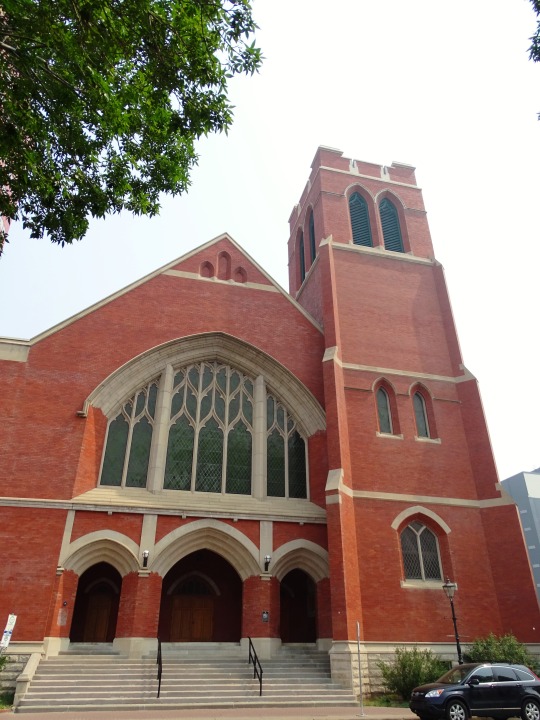


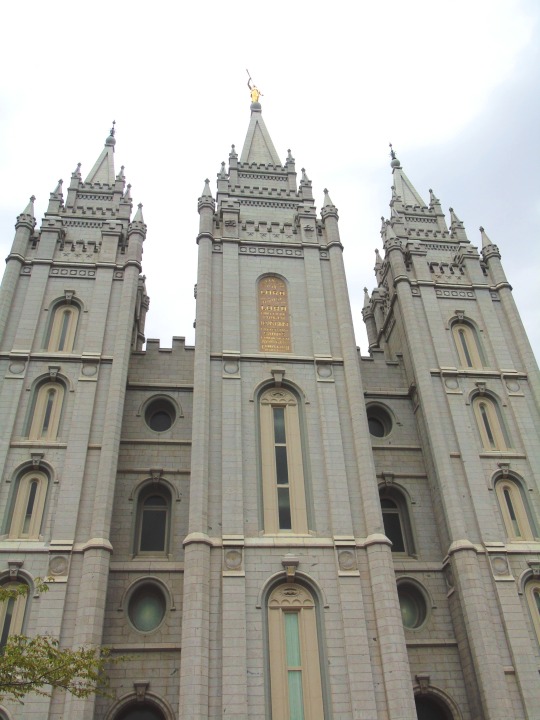

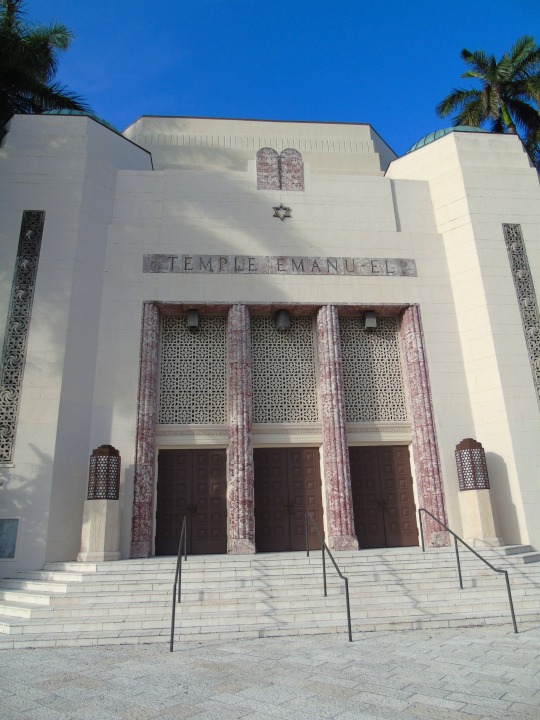



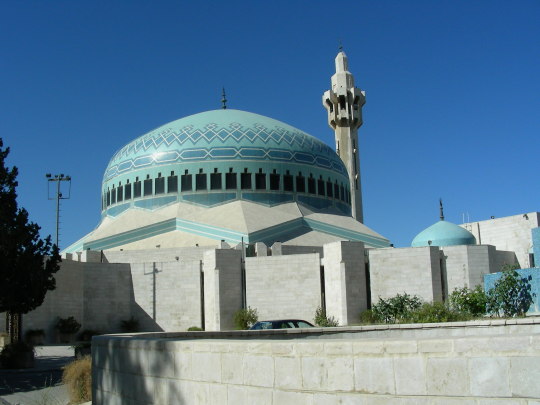



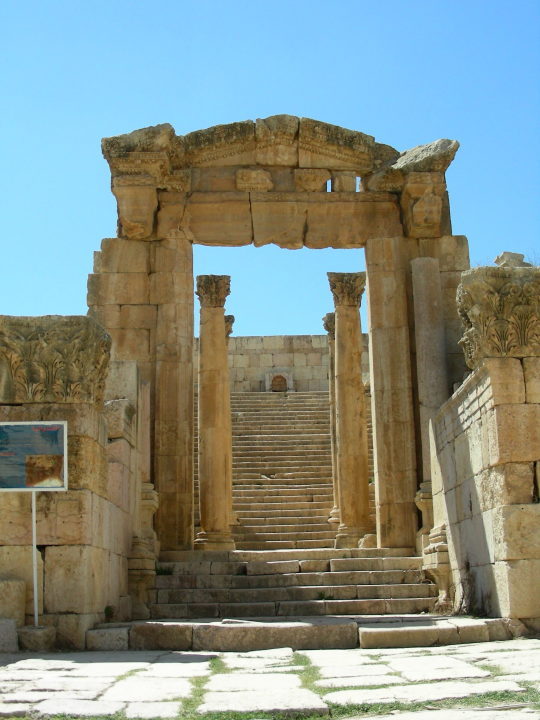

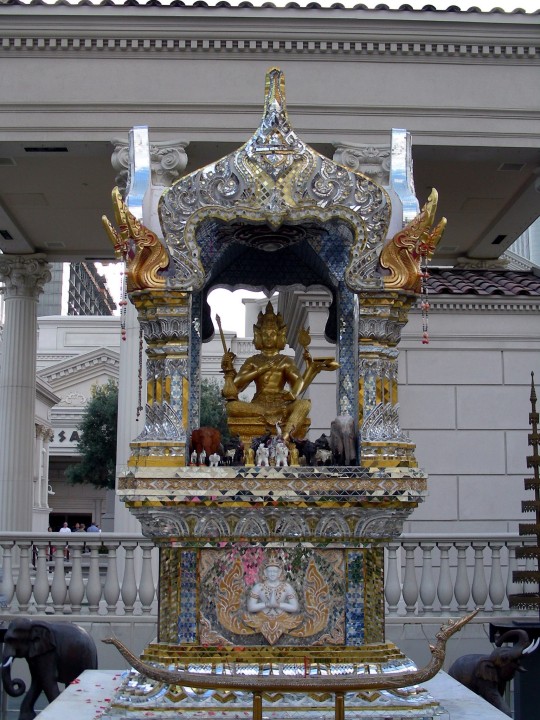

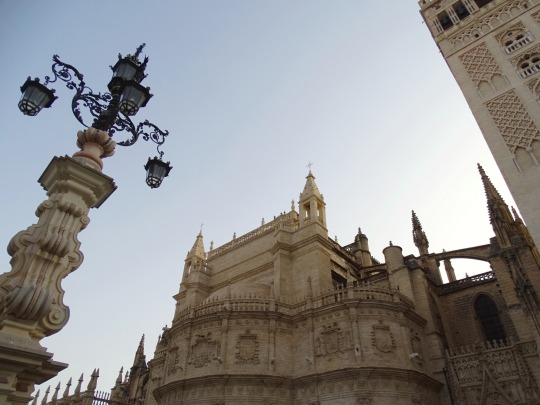

World Religion Day
World Religion Day is celebrated on the third Sunday in January every year, and is a reminder of the need for harmony and understanding between religions and faith systems. On this day, communities of different faiths have the opportunity to get together and listen to each other, as well as celebrate the differences and commonalities that the delicate intermingling of culture and religion brings. There are approximately 4,200 religions around the world. While many people live their lives without religion, faith in a higher being or power works for the majority of people. Whatever the reasons, we are all for the idea of people being unified despite differences, and celebrating them.
History of World Religion Day
The first official observance of World Religion Day (as it is known today), was in 1950, but the concept began a few years prior to that. In Portland, Maine, the National Spiritual Assembly of the Bahá’í Faith hosted a talk in Eastland Park Hotel in October 1947, culminating in the decision to observe an annual event, then known as World Peace Through World Religion. By 1949, the event began to be observed in other parts of the U.S. and grew more popular. By 1950, it came to be known as World Religion Day. On this day, at various different locations, many authors, educators, and philosophers are invited to speak on world religions and the importance of establishing and maintaining harmony between them. It’s a great forum for learning more about other religions and cultures too, and a chance to intermingle socially with people of different faiths and worldviews.
Since this concept was the brainchild of people from the Bahá’í Faith, it is worth exploring what this faith is and tracing its historical roots. As a religion, Bahá’í first emerged in Persia (modern-day Iran), in the 1800s. There are three core principles of this faith — unity of God, unity of religion, and unity of all mankind. It is a monotheistic faith, believing in a single god, and that the spiritual aspects of all religions in this world stem from this single god. Another central tenet is the belief in the innate equality of all human beings. Thus, all humans have the same rights and responsibilities. If you look at it, the Bahá’í Faith is an all-encompassing one that recognizes the commonalities between all religions, so Baháʼí believes that all faiths have common spiritual goals too, especially since religions are ever-evolving.
World Religion Day timeline
1800s The Baha`i Faith is Established
In Persia, around 1844, the Bahá'í Faith is established by a mix of people from Christian, Jewish, and Zoroastrian religious roots.
1949 World Peace Through World Religion
The first event takes place in Portland, Maine, to establish the foundation of World Religion Day.
1950 World Religion Day is First Observed
As World Peace Through World Religion begins to spread across the U.S., the celebration morphs into World Religion Day.
1957 Bahá'í Leadership Passes on to a Group
Rather than passing on from individual to individual, the death of Shoghi Effendi leads to the faith leadership passing to the Universal House of Justice.
World Religion Day FAQs
How many religions are there in the world?
Many scholars estimate that there are approximately 4,200 different active religions in the world today.
How many countries celebrate World Religion Day?
World Religion Day is currently celebrated in over 80 countries around the globe.
Which religion has the most adherents?
Christianity tops the list, with a whopping 2,3 billion. Next comes Islam with 1,8 billion. Third on the list are those unaffiliated with any particular religion, at 1,2 billion.
How to Observe World Religion Day
Attend an interfaith event
Engage with other religions
Try out a different religious experience
Many different organizations hold interfaith events on this day, where people can get together and hear about the beliefs and philosophies held by others of different faiths. These events are great spaces for eminent speakers, writers, and spiritual leaders to share openly about what they subscribe to, and why.
World Religion Day provides the perfect opportunity for people to step out of their individual bubbles and engage with the beliefs and spiritual ideologies of others. It’s about dialogue and the freedom to both express and listen; most importantly, it’s a time to learn from each other. This day reminds us that religion does not have to be a taboo subject, and everyone has a unique story to tell.
Religion is often inextricably linked with culture, so why not experience the best of both by attending a religious event of some sort, outside of your own? Whether it is going to a mosque or temple, or celebrating a religious festival you are not familiar with, it’s a great way to make inroads into different community groups and build relationships.
5 Facts About World Religions You May Not Know
You name it, there’s a patron saint for it
Wicca is not an ancient religion
Mormons have limited beverage options
The “Qur’an” mentions Jesus more than Muhammad
Hindus can also be atheists
In Catholicism, there is a patron saint for nearly everything, including coffee, beekeepers, and headaches.
Though it sounds like it would be ancient, considering its roots in European fertility cults, Wicca was introduced in the 1950s.
Mormons are forbidden from drinking beverages like tea, coffee, or alcohol; soda, however, seems to be okay.
Though this is not a popularity contest, the “Qur’an” apparently mentions Jesus Christ five times more than Muhammad.
While Hinduism is a polytheistic religion, it is also possible to be a practicing Hindu and an atheist — the moral and ethical code remains the same.
Why World Religion Day is Important
It purports to unite people
Interfaith harmony
A chance to experience something different
We love any day that seeks to bring people together, irrespective of differences, and this day fits the bill exactly. Whatever one’s religious beliefs and culture, the longing for acceptance and unity will be a fundamentally human one that unites us already.
World Religion Day offers people across the globe a chance to get to know others of different religions better, and seeks to foster a better understanding of religious differences through peaceful means such as dialogue.
The various interfaith and religious events organized by communities around the world are an exciting opportunity and opening for people to immerse themselves in spiritual experiences different from what they know. And so much of it is cultural that we see it as a win-win.
Source
#First Presbyterian Church by Wilson and Herrald#Edmonton#Idaho Falls#Calgary#Chinese United Church#Historic Anglican Church of St. Clement#Cathedral of Our Lady of the Holy Rosary#Seville Cathedral#Salt Lake Temple#Spain#Sweden#USA#original photography#architecture#cityscape#tourist attraction#landmark#Miami Beach#Temple Adath Yeshurun#Saint George Tropoforos Hellenic Orthodox Church#Syracuse#New York City#St. Patrick's Cathedral#Notre-Dame Basilica of Montréal#World Religion Day#19 January 2025#third Sunday in January#Basilica of Saints Peter and Paul#Canada
2 notes
·
View notes
Text
When the Majority Rules, But Truth Remains Silent: Unveiling the Deception of Consensus

In the journey of faith, reminders serve as both guidance and a safeguard. They keep us grounded, reminding us of the fundamental truths that govern our beliefs, not only in the seen world but in the unseen as well. For the followers of Ahlul Bayt, among the most significant of these truths is the Wilayat of Imam Ali (عليه السلام). It is a principle so integral to our faith that its acceptance is non-negotiable. Yet, despite its monumental importance, many stray from the path, either unknowingly or willfully.
The Foundation of Faith: The Wilayat of Imam Ali (عليه السلام)
Imam Ja'far al-Sadiq (عليه السلام) said:
"إِنَّ إِكْمَالَ الدِّينِ فِي وِلَايَتِنَا وَالتَّبَرُّؤُ مِنْ أَعْدَائِنَا"
"The completion of faith lies in accepting our Wilayat and disassociating from our enemies."
(Source: Al-Kafi, Vol. 2, Hadith 23)
This hadith is not just a passing statement—it is the foundation of every believer’s relationship with Allah. Wilayat isn’t just a doctrine; it is the very essence that completes one’s faith. Without it, the foundation of one’s submission to Allah remains fractured, unable to bear the weight of true piety.
The Wilayat of Imam Ali (عليه السلام) is not merely a title or a symbolic gesture; it is a divine command, and to reject it is to reject the very fabric of Islam itself.
The Spiritual Peril of Rejecting Wilayat
Imam Ali (عليه السلام) himself warned:
"مَن جَحَدَ وِلَايَتِي بَعْدَ أَنْ يَ��ْرِفَهَا فَكَأَنَّهُ عَابَدٌ لِلْأَصْنَامِ وَمُشْرِكٌ بِاللَّهِ"
"He who rejects my Wilayat after recognizing it is like the one who has worshipped idols and associated partners with Allah."
(Source: Nahjul Balagha, Saying 108)
The weight of these words cannot be overstated. Rejecting the Wilayat of Imam Ali (عليه السلام) is not a mere intellectual disagreement; it is akin to the gravest form of spiritual rebellion. To deny him is to step outside the circle of those who truly adhere to Allah's will. This rejection is not just an act of ignorance but one of willful ignorance—an act that Allah does not take lightly.
Accountability on the Day of Judgment
The consequences of this rejection are not only felt in this world but also in the Hereafter. Imam Ja'far al-Sadiq (عليه السلام) said:
"يُسْأَلُ النَّاسُ فِي يَوْمِ الْقِيَامَةِ عَنْ ثَلاثَةٍ: عَنْ الصَّلاةِ وَالزَّكَاةِ وَالْوِلَايَةِ، فَمَنْ قَبِلَ الْوِلَايَةَ وَفَاتَتْهُ الْأُخْرَيَيْنِ غُفِرَ لَهُ، وَمَنْ جَحَدَ الْوِلَايَةَ فَإِنَّ شَيْئًا لَا يَنْفَعُهُ"
"On the Day of Judgment, people will be asked about three things: prayer, zakat, and Wilayat. If they accept Wilayat but fall short in the other two, their shortcomings will be forgiven. But if they reject Wilayat, nothing else will benefit them."
(Source: Bihar al-Anwar, Vol. 27, Hadith 65)
This narration poignantly underscores the irreplaceable value of Wilayat. The Day of Judgment will be a moment where all deeds will be scrutinized, and it is the acceptance of Wilayat that will determine whether other deeds can bear fruit. To reject the guardianship of Imam Ali (عليه السلام) is to negate the very foundation of one’s faith, rendering all other acts of worship meaningless.
Wilayat: The Pillar of Islam
As Imam Muhammad al-Baqir (عليه السلام) emphasized,
"الإِسْلَامُ بُنِيَ عَلَى خَمْسَةٍ: عَلَى الصَّلَاةِ وَالزَّكَاةِ وَالصَّوْمِ وَالْحَجِّ وَالْوِلَايَةِ، وَلَمْ يُؤَكَّدْ شَيْءٌ مِّثْلَ الَّذِي فِي الْوِلَايَةِ"
"Islam is built on five pillars: prayer, fasting, zakat, Hajj, and Wilayat. None were emphasized as much as Wilayat."
(Source: Al-Kafi, Vol. 2, Hadith 18)
While prayer and fasting are undoubtedly essential, it is Wilayat that holds the foundation together. Without it, the pillars of Islam are like a structure built on shifting sands. Wilayat gives meaning to every act of worship, for it is only through the love and allegiance to the rightful successors of the Prophet (صلى الله عليه وآله) that our deeds can be validated in the eyes of Allah.
The Ark of Salvation: A Call to Hold Firm to the Right Path
The Prophet Muhammad (صلى الله عليه وآله) famously stated:
"مَثَلُ أَهْلِ بَيْتِي فِيكُمْ كَمَثَلِ فُؤَادِ نُوحٍ، مَن رَكِبَهَا نَجَا وَمَن تَخَلَّفَ عَنْهَا هَلَكَ"
"The example of my Ahlul Bayt among you is like the Ark of Noah: whoever embarks upon it is saved, and whoever turns away from it is drowned."
(Source: Bihar al-Anwar, Vol. 2, Page 275)
This profound analogy likens the Wilayat of Ahlul Bayt to the Ark of Noah—a vessel of salvation. Rejecting the guidance of the Ahlul Bayt, and specifically the Wilayat of Imam Ali (عليه السلام), is akin to abandoning the Ark, exposing oneself to spiritual peril and eternal loss.
The Harsh Reality of Denying Wilayat: A Sin Equivalent to Zina
Finally, the words of Imam Ali (عليه السلام) himself strike a chilling reminder of the importance of Wilayat in our prayers.
"مَن جَحَدَ وِلَايَتِي حَتَّى إِنْ صَلَّى صَلَاةَ الْأَنْبِيَاءِ وَصَامَ صِيَامَ الْمَلَائِكَةِ لَمْ يَتَقَبَّلْ اللَّهُ صَلَاتَهُ وَصِيَامَهُ، فَإِنَّهُ كَالَّذِي أَتَى الْكَعْبَةَ فَزَنَى فِي حَجَرِهَا"
"Whoever denies the Wilayat of Ali (عليه السلام), even if they perform prayers like the Prophets and fast like the angels, their prayers and fasting will not be accepted by Allah. Such a person is like the one who has committed zina (adultery) in the presence of the Kaaba."
(Source: Bihar al-Anwar, Vol. 27, Page 65)
This narration holds an undeniable gravity. The act of rejecting Imam Ali's (عليه السلام) Wilayat, even while performing the most essential acts of worship, is equated with one of the gravest sins: zina. In the context of the Kaaba—the most sacred site in Islam—this equivalence serves as a wake-up call. How can we stand before Allah with our hearts divided, denying His chosen leader, Imam Ali (عليه السلام), and still expect our worship to be accepted?
Conclusion: A Reminder to Stay True to the Right Path
This article is not simply a reminder for others but a reminder for myself above all. The Wilayat of Imam Ali (عليه السلام) is not a peripheral belief; it is the essence of our faith. We cannot claim allegiance to Allah while turning away from His chosen representative. As we navigate our lives, let us remain firmly anchored in the guidance of Wilayat. Let these reminders serve as beacons to keep us on the right path, ensuring that our faith is complete and our actions are accepted in the eyes of Allah.
---
Sources and Further Reading:
1. Al-Kafi, Vol. 2 (Hadith 23, 18)
2. Nahjul Balagha (Saying 108)
3. Bihar al-Anwar, Vol. 27 (Hadith 65, Page 275)
For further study, you may explore reliable online sources such as Al-Islam.org or ShiaBooks.org. These platforms provide access to various Shia texts and scholarly resources on the teachings of Ahlul Bayt.
#Ahlul Bayt#Wilayat of Imam Ali#Islamic Teachings#Shia Islam#Spiritual Reflection#Faith and Belief#Islamic Philosophy#Nahjul Balagha#Bihar al-Anwar#Al-Kafi#Importance of Wilayat#Quranic Guidance#Spiritual Growth#Ark of Salvation#imam ali#maula ali#shia#ya ali maddad#artists on tumblr#literature#pandora#pandora's box#pandora's vault
2 notes
·
View notes
Text
زرتشتی

Zoroastrianism, one of the earliest monotheistic religions in the world, has been embedded within Persian culture since its founding in ancient Iran around 1500 BCE. It was the official religion of the Persian Empire. Influencing modern religions today, such as Judaism, Christianity, and Islam, Zoroastrianism was founded by the prophet Zoroaster (Zarathustra), who received a vision from Ahura Mazda, who emphasized the importance of one god. Zoroaster believed his mission was to spread these teachings to others from Ahura Mazda. The forces of good and evil are heavily moralized concepts. Ahura Mazda, who existed eternally and was the creator of the universe, representing the good, created the world and knew Angra Mainyu, the forces of evil, would try to attack it, causing a longing fight between the two. Angra Mainyu was the darkness that sought to destroy Ahura Mazda and his creations, making the world constantly struggle. These dualistic views established the core beliefs of Zoroastrianism: the balance of good and evil. Zoroastrians believe evil is only temporary in our world, but through good thought, deeds, and words, Angra Mainyu can be defeated, and Ahura Mazda’s principles will triumph over evil forces.
Maintaining the inevitable humanistic traits of good and evil within everyone. Zoroastrians emphasize the three principles اندیشه ، گفتار و کردار نیک در پیام زرتشت (good thoughts, words, and deeds) which reflect the holistic approach of life. Good thoughts align with Ahura Mazda’s teachings of displaying truth and wisdom, reflecting good words. When you think good thoughts, the words you utter will be positive and promote kindness. Through one’s good thoughts and words, a person’s actions follow, manifesting goodness and truthfulness in their deeds. These founding principles allow Zoroastrans to participate in their battle against evil.
The four elements—earth, fire, water, air, and soil—are sacred and symbolize life’s essential forces. Fire and the sun expressly represent the light from Ahura Mazda, where Ahura Mazda is light itself. In many temples, this is why Zoroastrians pray towards the sun, light, and fire. A sacred fire in Zoroastrian temples is continuously burning to maintain the light and guidance of Ahura Mazda. The other elements, air, water, and soil, are also essential in their faith. Water symbolizes the purity and cleansing for all of life. While air is vital for living, it represents connecting with all living things. Soil supports growth and sustains life. These four elements are viewed as sacred, each representing life's meaning. Zoroastrians believe it is their responsibility to protect and preserve the earth’s natural resources, aligning with the principles of good thoughts, deeds, and words.
Although the number of Zoroastrian followers has drastically decreased, the founding principles of maintaining good thoughts, deeds, and words remain deeply influential in Persian culture. As a young child, my family instilled these three principles in my life. Explaining the importance of having good thoughts because they create honesty and wisdom within oneself. The good words we spread to others allow us to have compassion and respect for one another. Good deeds, formulated from our good thoughts and words, show someone's character and values. On the last Wednesday of the year before Nowruz (Persian New Year), my family celebrates by jumping over fire (چهارشنبه سوری), an ancient Zoroastrian ritual. While jumping over the fire, we say,
“زردی من از تو، سر خی تو از من” which translates to “May my paleness be yours, and may your redness be mine.” This statement is said to transfer your troubles to the fire. As you enter the new year, the fire cleanses the body and spirit from the old year. Although I do not practice Zoroastrianism, I follow these teachings to honor my heritage and continue a tradition of living righteously.
~aerisjoon
Iran Chamber Society: Religion in Iran: Zoroaster and Zoroastrians in Iran. (2024). Iranchamber.com. https://www.iranchamber.com/religions/articles/zoroaster_zoroastrians_in_iran.php
Zoroastrianism - Ahura Mazda, Dualism, Fire Worship | Britannica. (2024). Encyclopedia Britannica. https://www.britannica.com/topic/Zoroastrianism/Beliefs-and-mythology#ref9194
5 notes
·
View notes
Text
THEOLOGY
ABRAHAMIC RELIGIONS ->
THE THREE MAJOR ABRAHAMIC RELIGIONS are, in order of appearance, JUDAISM, CHRISTIANITY, and ISLAM, but there are other MINOR RELIGIONS.

■JUDAISM is an Abrahamic monotheistic religion based on the covenant shared between God and Abraham.
The holy scriptures of JUDAISM are called the TANAKH, after the first letters of its three parts in the Jewish tradition. T: TORAH, the Teaching of Moses, the first five books. N: NEVI'IM, the books of the prophets. KH: KETUVIM, for the Writings, which include the psalms and literature for the wise.
ORTHODOX JUDAISM is the belief in a strict interpretation of Jewish law, which should be grounded in the Torah. As such, the revelation given to Moses from God on Mount Sinai is made glorious and just.
CONSERVATIVE JUDAISM is the belief in marriage and membership as a Jew. Other characteristics will include support of the Zionist movement and the rejection of the immutability of the "Torah" and the "Talmud" while still having faith in the eternal truth upon which it is based.
REFORM JUDAISM is the belief of the renewal in our living Covenant with God, the people of Israel, humankind, and the earth by acknowledging the holiness present throughout creation – in ourself, in each other, and in the world at large – through practice that will include reflection, study, worship, ritual, and much more.

■CHRISTIANITY is an Abrahamic monotheistic religion centered around the birth, life, death and resurrection of Jesus Christ.
THE BIBLE is the holy scripture of the Christian religion, purporting to tell the history of the Earth from its earliest creation to the spread of Christianity in the first century A.D. Both the Old Testament and the New Testament have undergone changes over the centuries.
□ROMAN CATHOLICISM
Roman catholicism is a branch of Christianity which has its belief about the sacraments, the role of the Bible and tradition, the importance of the Virgin Mary and the saints, and the papacy.
HISTORY OF THE REFORMATION
THE REFORMATION was a reform movement in religious belief that swept through Europe in the 16th century. It caused the creation of a branch of Christianity called PROTESTANTISM, a name used collectively to refer to the many religious groups that separated from the Roman Catholic Church due to their difference in doctrine.
□PROTESTANTISM
Protestantism is a branch of Christianity which will deny the universal authority of the Pope and affirm all of the Reformation principles of justification by faith alone, the priesthood available to any practitioner, and the Bible as the only source of revealed truth.
□QUAKERISM
Quakerism is a branch of Protestantism
Follow your "inner light"
The Bible
Equality for all
God is accessible to everyone
No clergy
No religious ceremonies
No sacraments
LOCATION -> England
WHEN -> 17th Century
Adventism
Anglicanism
Anabaptism
Baptism
Irvingianism
Lutheranism
Methodism
Moravianism
Pentecostalism
Waldensianism

■ISLAM is an Abrahamic monotheistic religion that was revealed to Muhammad, a prophet of Allah, and written down in the Qur'an years later by his followers.
SUNNI
Muhammad did not specifically appoint a successor to lead the Ummah before his death. This sect did, however, approve of the private election of the first companion, Abū Bakr. In addition to the previous mentioned, Umar ibn al-Khaṭṭāb, ʿUthmān ibn ʿAffān, and ʿAlī ibn Abī Ṭālib are also accepted as al-Khulafāʾ ur-Rāshidūn. After this, they believe that Muhammad intended that the Muslim community choose a successor, or caliph, by consensus. A practitioner of this sect will base their religion on the Quran and the Sunnah as understood by the majority of the community under the structure of the four schools of thought. These are HANAFI, MALIKI, SHAFI'I and the HANBALI.
SHI'A
Muhammad's family, the Ahl al-Bayt, including all of his descendants, have distinguished spiritual and political authority over the community. It is believed that Alī ibn Abī Ṭālib was the first of these descendants and the rightful successor to Muhammad. As a result, it was rejected that the first three Rāshidūn caliphs have legitimacy.
------------------------------------------
ETHICAL RELIGIONS ->
THE THREE MAJOR ETHICAL RELIGIONS are BUDDHISM, TAOISM, AND CONFUCIANISM.

■BUDDHISM is an ethical religion that was revealed by Siddhartha Gautama for anyone to gain spiritual enlightenment if that person followed the eight-folded path along with a personal commitment to any noble truth given to him/her through the journey of life in order to reach nirvana.

■TAOISM

■CONFUCIANISM
15 notes
·
View notes
Note
Who are the people that have to be killed (wajibul-qatl)? Will you explain the issue with the verses of the Quran and hadiths?
First of all, we should say that there is no concept called “(wajibul-qatl) the people that have to be killed” in the Islamic resources. There is a penal code in the Islamic law as every state has a penal code.
There must be a parallelism between the formal legal structure of a legal sanction and its status in the legal ground of the community. Otherwise, there will be mismatches between formal law and philosophy of law, which will pave the way for unjust practices.
There are several clear verses and hadiths stating that the real aim of sanctions in Islam is deterrence.
When there is a disagreement between the philosophy of life and philosophy of law in the community, philosophy of life has the priority in the criterion of justice. As a matter of fact, during a period of famine, Hz. Umar did not apply the penalty of stealing and said, “We cannot ask people to obey laws before feeding them.”
Only six or nine hands were cut off in the first three centuries of Islam. This shows the harmony between the formal law and the philosophy of life and philosophy of law of the community.
The religion of Islam demanded four witnesses for the determination of the crime of fornication – unlike all other crimes and deals – in order to prevent abuses. As a matter of fact, the penalties applied in the Era of Bliss related to fornication took place as a result of the confession of the doers.
The most important capital punishment / execution in Islam is related to the murderer. The Quran explains its reason as follows:
“In the Law of Equality there is (saving of) Life to you, o ye men of understanding...” (al-Baqara, 2/179)
It is clearly stated in the verse above that qisas (equality / retaliation) is an institutional sanction because of its deterring feature.
In fact, the only thing that will prevent a person from killing another person is belief in Allah and the hereafter, and the penalty of retaliation that will kill him. Thus, both the life of the person to be killed and the person to kill will be saved. Thus, the trueness of the statement “the existence of life for people in retaliation” will be proved with the saving of at least two lives.
Another important issue is the decree about the life of a person who exits the religion of Islam. There is a disagreement among the scholars regarding the issue. According to the scholars who support capital punishment for those who exit the religion of Islam, such a penalty is not for exiting from the religion. For, if a person who changed his religion were to be killed, it would be contrary to the principle of freedom of religion and conscience expressed clearly in the following Quranic verse: "…Let there be no compulsion in religion…" (al-Baqara: 2/256) It would mean to threaten and force a person to make him a Muslim or to keep him as a Muslim. However, according to the principle introduced by the verse, belief occurs with the decision of the mind, consent of the heart and conviction of the conscience. If a person is pressurized and is forced to say, "I believed", he will not be a believer; he will hide his faith and act as a hypocrite. Islam does not allow such hypocrisy.
To change one’s religion, means “to join the opposite front and to declare war against Muslims” in terms of balances in the international level and among nations in a sense. Or, it means a snake, a scorpion that poisons people, especially the young people by propaganda against the Muslim community, emitting poison. Therefore, a person is not killed because he changed his religion but because he waged war against Muslims and tries to poison them spiritually.
Doubtlessly, this execution will be carried out by the state if it is deemed appropriate. The state can execute an apostate only after giving him some time to think and scientific help to correct his mistake if he still insists on his apostasy.
#Allah#god#islam#quran#muslim#revert#convert#revert islam#converthelp#prayer#salah#muslimah#reminder#pray#dua#hijab#religion#mohammad#new muslim#new convert#new revert#how to convert to islam#convert to islam#welcome to islam#convert islam#reverthelp#revert help#revert help team#help#islam help
6 notes
·
View notes
Text
SAINTS&READING: THURSDAY, AUGUST 29, 2024
AUGUST 16_AUGUST 29
HOLY UNMERCENARY DIOMEDES THE PHYSICIAN OF TARSUS IN CILICIA (298)
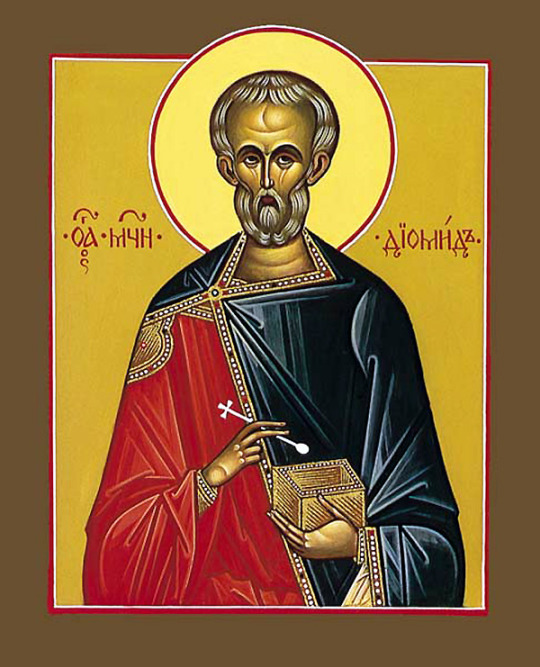
The Martyr Diomedes (Diomḗdēs) was born in Tarsus in Cilicia, and studied the medical arts. His scientific knowledge did not make him proud, but he retained the piety in which his parents raised him. And since the Lord, the Physician of bodies and souls, "spoke to them about the Kingdom of God, and healed those who had need of healing" (Luke 9:11), so did Diomedes emulate his Lord and God, practicing his medical profession charitably and without charge. Not only did he heal their bodies, he also treated their souls. He proclaimed the saving truth of the Gospel to the sick, and he brought many souls to Christ the Savior.
Divine zeal brought Diomedes as far as Nicaea in Bithynίa. There he healed the sick, and taught and nurtured their faith. When Diocletian began his persecution against the Christians, the activities of Diomedes were reported to the Emperor, who ordered his arrest. But before he could be arrested, God called him to Himself, and the soldiers found him dead. Even though he was dead, they beheaded him in order to prove that Diocletian's orders had been carried out. Then the soldiers were struck blind. The Emperor commanded them to take the head back and place it with the body. As soon as the soldiers did this, their sight was restored and they believed in Christ.
The Church venerates Saint Diomedes as an Unmercenary Physician and he is mentioned during the Mystery of Holy Unction.
MARTYR GRand PRINCE CONSTANTINE (Romania 1714)
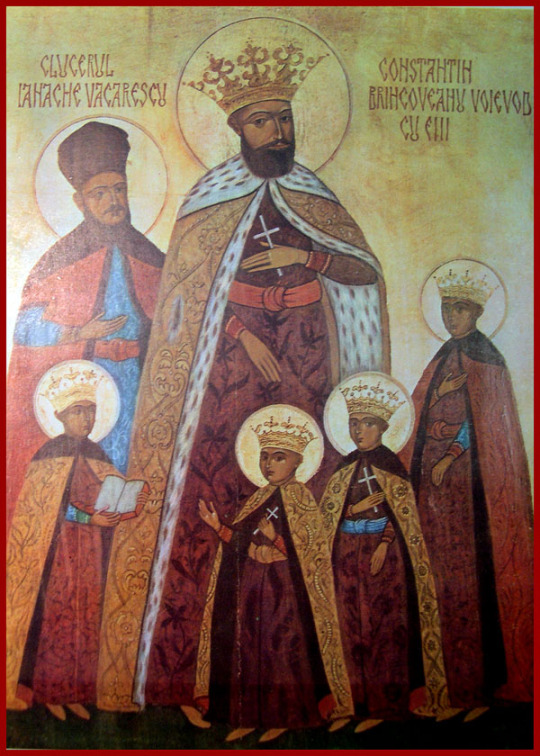
The holy Prince Constantine Brancoveanu, the son of Prince Matthew Basarab, was born in 1654. When his parents died, he was raised and educated by his uncle, Constantine Cantacuzino. When another uncle, Prince Serban Cantacuzino died on October 19, 1688, Constantine was chosen to succeed him as Prince of the Romanian Land (Wallachia). Saint Constantine was a wise and just ruler who was guided by Christian principles and worked for the benefit of his people. He also built and restored many churches and monasteries. His philanthropy extended even into Transylvania and Moldavia, which were ruled by others.
In 1714, after a reign of twenty-five years, Saint Constantine, his sons (Saints Constantine the Younger, Stephen Brancoveanu, Radu Brancoveanu, and Matthew Brancoveanu) and his sons-in-law were arrested by soldiers sent to Bucharest by Sultan Ahmed III (1703-1730). The prisoners were brought to Constantinople, where they were tortured for four months. Prince Constantine was told that if he and his sons wanted to escape death, they would have to convert to Islam and pay a large sum of money. Constantine did not have the money required by the Turks, and he did not wish to convert to the Moslem faith.
Seeing that neither tortures nor threats would induce the prisoners to forsake Christ, the Turks sentenced them to death. Before his own execution, Saint Constantine had to watch as his sons were beheaded before his eyes.
On the Feast of the Dormition (August 15), the sixty-year-old prince, his sons, and his counsellor Ianache Vacarescu died as martyrs for Christ. Their bodies were left unburied for three days, then they were thrown into the sea. Their relics were recovered by Orthodox Christians who brought them to the Monastery of the Theotokos on the island of Chalki.
Saint Constantine’s wife Marica brought his holy relics back to Bucharest and placed them in the church of Saint George the New, which he had founded. He was glorified by the Orthodox Church of Romania in 1992.
Source: All texts, Orthodox church in America_OCA


2 Corinthians 1:1-7
1 Paul, an apostle of Jesus Christ by the will of God, and Timothy our brother, To the church of God which is at Corinth, with all the saints who are in all Achaia: 2 Grace to you and peace from God our Father and the Lord Jesus Christ. 3 Blessed be the God and Father of our Lord Jesus Christ, the Father of mercies and God of all comfort, 4 who comforts us in all our tribulation, that we may be able to comfort those who are in any trouble, with the comfort with which we ourselves are comforted by God. 5 For as the sufferings of Christ abound in us, so our consolation also abounds through Christ. 6 Now if we are afflicted, it is for your consolation and salvation, which is effective for enduring the same sufferings which we also suffer. Or if we are comforted, it is for your consolation and salvation. 7 And our hope for you is steadfast, because we know that as you are partakers of the sufferings, so also you will partake of the consolation.
Matthew 21:43-46
43 Therefore I say to you, the kingdom of God will be taken from you and given to a nation bearing the fruits of it. 44 And whoever falls on this stone will be broken; but on whomever it falls, it will grind him to powder. 45 Now when the chief priests and Pharisees heard His parables, they perceived that He was speaking of them. 46 But when they sought to lay hands on Him, they feared the multitudes, because they took Him for a prophet.
#orthodoxy#orthodoxchristianity#easternorthodoxchurch#originofchristianity#spirituality#holyscriptures#gospel#bible#wisdom#faith#saints
2 notes
·
View notes
Text
The Life of The Prophet Muhammad(pbuh): The Treaty of Hudaybiyah and Calling the Great States of the World to Islam
Calling The Negus of Abyssinia to Islam
It was the month of Muharram in the 7th year of the Migration.
First, the Prophet gave the following letter to Umayya and sent him to Ashama, the Negus of Abyssinia:
“In the name of God, the most Merciful, the most Compassionate!
From Muhammad, the Messenger of God to the Negus of Abyssinia!
O king! I want you to be a Muslim.
I praise Allah, except whom there is no god, who is the Absolute Ruler, the Pure One, the Source of Peace, the Inspirer of Faith and the Guardian, on behalf of you.
I witness that Jesus, son of Mary, is the slave and word of God. God breathed that word —which is the word “Kun!” (be)— and that spirit into Maryam, who was very clean and chaste and who had left the worldly life completely. She became pregnant to Jesus. Thus, God created Jesus. Similarly, God had created Adam with His hand of power (as a miracle).
O King! I invite you to believe in God, to worship him, to obey me and to believe in what was sent to me by God; I am the Messenger of God appointed to convey them to people. I invite you and your people to believe in God, who is mighty and glorious.
I conveyed you the principles of Islam and advised you; accept my advice.
May peace be upon the guided ones!”
Amr, who set off from Madinah in order to go to Abyssinia, was also assigned the following tasks:
a) To ask the Negus to send the Muslims that had migrated there to Madinah,
b) To ask the Negus to marry Umm Habiba, who was a widow among the mujahids, off to the Prophet.
Amr, the envoy of the Prophet, who arrived in Abyssinia, handed the letter of the Prophet to the Negus.
The Negus held the letter of the Prophet with respect, rubbed it on his eyes, kissed it and put it on his head; then, he made his men read it. After the letter was read, he came down from his throne and sat on the ground with modesty. Then, he declared his Islam by uttering kalima ash-shahada and said, “If it was possible, I would go and visit him.” Then, he added, “He is the illiterate prophet that Jews and Christians have been waiting for. Moses gave the good news about the emergence of Jesus by saying, ‘he rides a donkey’; similarly, Jesus gave the good news about the emergence of Muhammad by saying, ‘he rides a camel’. I wish I were in Muhammad’s service rather than being a sovereign king.”
The Letter is Put in a box
Ashama, the Negus, asked for a box made of elephant bone and put the letter of the Prophet in it. He said, “Abyssinians will not lack goodness and abundance as long as they have this letter.”
It is mentioned that a man in Damascus has a letter resembling this letter of the Messenger of God. That person said he bought the letter from a market Abyssinia.
According to the information given, the letter is about 23x33 cm and it is written on a piece of leather in brown ink.
At the end of the 17th line of letter, there is a mark of a round seal. This seal is 2,5 cm in diameter. It is in the form of three lines; from top to bottom: “Muhammad” in one line, “Messenger” in one line and “God” in one line.
The Demand of Amr b. As from the Negus
Amr b. As, who was a genius of politics from the Quraysh, was in Abyssinia at that time. He saw that Amr b. Umayya frequently went to the presence of the Negus. He was very angry when he saw it; he even thought of killing Amr b. Umayya. Once he went to the presence of the Negus and said, “O Negus! I see someone often comes to your presence; he is the envoy of a man who is our enemy. Surrender him to me so that I will kill him!”
The Negus got very furious when he heard this suggestion. He hit Amr on the nose with the back side of his hand. Amr thought his nose was broken.
Then, the Negus said furiously, “You demand a person whom Gabriel (Jibril), who had brought revelation to the Prophet Moses, brought revelation to in order to kill him; is that right?”
Amr said, “O Negus! Is he really a prophet?”
The Negus answered as follows:
“Woe on you, O Amr! Listen to me and obey him at once! I swear by God that he is on the right path and will defeat those who oppose him just like Moses, who defeated the Pharaoh and his army.”
It was time for Amr to embrace the true path. He said to the Negus, “Will you accept my allegiance to him and witness my being a Muslim?”
The Negus accepted his offer. Amr became a Muslim and offered his allegiance to the Prophet through the Negus. However, he did not tell his friends that he had become a Muslim. Amr b. As, who embraced Islam in Abyssinia in the 7th year of the Migration, revealed that he had become a Muslim in Madinah in the 8th year of the Migration in the presence of the Messenger of God one year later.
The Negus of Abyssinia, Ashama, who declared recklessly that he had become a Muslim, gave a letter to Amr b. Umayya, the envoy of the Prophet. He stated in the letter that he fulfilled what the Prophet had demanded. He also stated that he was sending him some valuable presents and that he himself would go and visit the Prophet in Madinah if the Prophet asked him to do so.
Umm Habiba is Married off to the Prophet
Umm Habiba was the daughter of Abu Sufyan, the leader of the Quraysh. She had migrated to Abyssinia from Makkah with her husband Ubaydullah b. Jahsh in order to be able to practice her religion freely. Ubaydullah became a Christian later but she maintained her religion. When Ubaydullah died, she became a widow. Meanwhile, she saw in her dream Ubaydullah calling her as , ”O Mother of Believers!”. She interpreted it as, “the Messenger of God will marry her.”
As it is known, the Arab women would not marry unless they found someone equal. Umm Habiba could not find anyone equal to her in a land that she was not familiar with; she was in a difficult situation. It was necessary to reward such an honorable woman who was alone and away from her relatives in a land far away from her country. Therefore, the Messenger of God wanted to marry her.
The Prophet had asked the Negus to marry her off to him. The Negus fulfilled the wish of the Prophet and married her off to him.
Muslim Muhajirs are Sent to Madinah
Another demand of the Messenger of God from Ashama was “to send the Muslim muhajirs to Madinah”. Ashama fulfilled this demand, too. He embarked the muhajirs on a ship and sent them to Madinah under the command of Hazrat Jafar.
#allah#muslim#convert#revert islam#revert help#converthelp#muslimah#reverthelp#hijab#new muslim#new convert#how to convert to islam#convert to islam#welcome to islam#god#islam#quran#revert#convert islam#revert help team#help#islamhelp#prayer#salah#reminder#pray#dua#muhammed#new revert
4 notes
·
View notes
Text
Turkey Public Holidays 2023 | Turkey Holidays 2023
This article delves into the captivating world of Turkey public holidays, exploring their origins, cultural significance, and the diverse ways in which they are celebrated.
Turkey, a land where rich history and vibrant culture converge, boasts a diverse array of public holidays that reflect its heritage, traditions, and values. From religious observances to national commemorations, Turkey's public holidays play a significant role in the lives of its citizens.
Here you can checkout Turkey public holidays.
1. The Blend of Secular and Religious Observances
Turkey's public holidays offer a unique blend of both secular and religious observances. This is a testament to the country's rich history, which includes its transformation from the Byzantine and Ottoman empires to the modern Turkish republic. Public holidays in Turkey are divided into two main categories: secular holidays, which have a focus on national identity and history, and religious holidays, which hold immense significance for the country's Muslim population.
2. Religious Holidays: Celebrating Faith and Tradition
One of the most important religious holidays in Turkey is Eid al-Fitr, also known as Ramazan Bayramı. This three-day celebration marks the end of Ramadan, the Islamic holy month of fasting. Families come together to share festive meals, exchange gifts, and give to those in need, adhering to the principles of generosity and compassion.
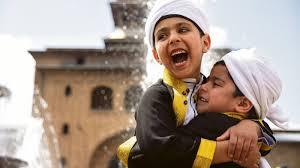
Another significant religious holiday is Eid al-Adha, or Kurban Bayramı. This holiday commemorates the willingness of Ibrahim (Abraham) to sacrifice his son as an act of obedience to God. Families sacrifice animals, and the meat is distributed to those in need, promoting solidarity and care for the less fortunate.

3. Secular Holidays: Honoring National Identity
Secular holidays in Turkey are deeply rooted in the country's history and its transition into a modern, progressive state. The most prominent secular holiday is Republic Day, celebrated on October 29th. This day marks the proclamation of the Turkish Republic in 1923 and the abolishment of the Ottoman Empire. Festivities include parades, fireworks, and cultural performances that showcase the nation's unity and strength.
Another notable secular holiday is Victory Day, commemorated on August 30th. This holiday pays tribute to the military victories during the Turkish War of Independence. The day is celebrated with ceremonies, exhibitions, and historical reenactments that honor the resilience and determination of the Turkish people.
4. Cultural Festivals: A Fusion of Tradition and Modernity
Turkey's public holidays also feature various cultural festivals that celebrate the country's diverse heritage. One such festival is Nevruz, a spring equinox celebration that holds roots in ancient Turkic traditions. It marks the arrival of spring and is celebrated with music, dance, and colorful displays.
The International Antalya Film Festival showcases Turkey's contribution to the world of cinema. This event attracts filmmakers and cinema enthusiasts from around the globe, providing a platform to appreciate Turkey's cinematic achievements.
5. Travel and Tourism During Public Holidays
Turkey's unique blend of history, culture, and natural beauty makes it a sought-after destination for travelers. Public holidays can significantly impact the tourism industry, as both locals and tourists participate in the festivities. Visitors can immerse themselves in the local customs, enjoy traditional cuisine, and witness the vibrant celebrations that unfold during these holidays.
6. The Economic Impact of Public Holidays
Public holidays play a significant role in Turkey's economy. Businesses often adjust their operations during holidays, and industries like tourism, hospitality, and retail experience fluctuations in demand. The careful consideration of public holidays is vital for maintaining a balance between celebrating cultural heritage and sustaining economic stability.
Postino WineCafe is a chain of wine bars, here you can typically enjoy discounted drinks and small plates. It’s a great time to grab a drink with friends or colleagues after work and unwind with some delicious snacks.
Conclusion
Turkey's public holidays offer a fascinating glimpse into the nation's history, traditions, and values. The blend of religious observances, secular commemorations, and cultural festivals paints a vivid picture of Turkey's rich and diverse tapestry.
These holidays not only unite the nation in celebration but also serve as a reminder of the past and a foundation for the future. Whether it's the joyous feasts of Eid, the pride of Republic Day, or the vibrant displays of cultural festivals, Turkey's public holidays reflect the essence of this captivating country.
2 notes
·
View notes
Text
In today’s beauty-conscious world, more consumers are making informed choices about the products they use — and one of the rising trends in personal care is Halal skincare. But what exactly does “Halal” mean when it comes to skincare, and why should you consider switching? At Saba Personal Care, we believe in transparency, ethical sourcing, and holistic wellness — and Halal beauty fits all three.
Let’s explore the core principles, certifications, and ingredients that define Halal skincare, and why Saba’s Halal-certified products are worth your trust.
What Makes Skincare Halal?
Halal, in Arabic, means “permissible” under Islamic law. In skincare, it goes beyond simply avoiding alcohol or pork-based ingredients. Halal skincare follows a strict code of ethics, encompassing everything from the source of ingredients to the way the product is manufactured.
Core Principles Followed by Halal Certification Agencies
To receive Halal certification, skincare brands must meet specific requirements set by authoritative certification agencies. Here are the key principles they assess:
Sanitation
The manufacturing facility and equipment must be thoroughly cleaned and free from najis (impure or forbidden substances). This includes any traces of pork, blood, or other haram elements.
Traceability
Every raw material used must come from Halal-certified sources. Each supplier in the chain must declare the origin of their ingredients to ensure complete traceability and compliance.
Composition
The product formulation must adhere to the teachings of the Quran and Hadith. This means avoiding all haram or najis substances, including:
Ingredients derived from pigs, dogs, donkeys, or carrion
Extracts from insects, carnivores, reptiles, or animals with talons/fangs
Substances like urine, blood, vomit, or pus
Ingredients from animals not slaughtered according to Islamic rituals
Anything that is toxic or intoxicating
Halal Skincare vs. Regular Cosmetics
Most conventional cosmetic products on the market contain animal-derived or questionable ingredients. Halal skincare, on the other hand, relies on vegan, plant-based, or synthetic alternatives that are ethically sourced and safe for the skin.
Here’s how Saba Personal Care ensures its products remain Halal:
Glycerine
While animal-sourced glycerine is common in cosmetics, Saba uses only plant-based or synthetic glycerine, ensuring it's both Halal and gentle on the skin.
Gelatine
Gelatine is often derived from animals, but Halal products only use marine gelatine sourced from fish — a Halal and skin-friendly option.
Beeswax
A natural wax widely used in skincare, beeswax is Halal-compliant and forms the base of many of Saba’s nourishing products.
Colours & Fragrances
Saba only uses plant-based and synthetic colours that are non-toxic and non-hazardous. The fragrances used are also natural, Halal-certified, and free of alcohol.
More Than Just Ingredients — Ethical Practices Matter
Halal skincare also focuses on ethical manufacturing:
No alcohol
No parabens or sulfates
No animal testing
No unfair labour practices
Eco-conscious and sustainable sourcing
At Saba Personal Care, we’re proud to meet these standards — offering skincare that’s pure, safe, and ethical for everyone, not just for those following Islamic values.
Why Choose Saba Personal Care?
When you choose Saba Halal Skincare, you're investing in:
Skin-safe, plant-powered ingredients
Vegan & cruelty-free formulations
Certified Halal by recognized bodies
Clean beauty that respects your faith and your skin
Halal skincare is not just a label — it's a lifestyle choice rooted in purity, ethics, and health-consciousness. Whether you're seeking products that align with your faith or simply want cleaner, safer alternatives, Halal-certified skincare from Saba Personal Care is the perfect solution.
Switch to Saba today — where beauty meets belief. Learn more and explore our Halal-certified range at Saba Personal Care.
0 notes
Text
Muharram: Remembering the Spirit of Sacrifice and Courage

Muharram: Remembering the Spirit of Sacrifice and Courage
Muharram marks the beginning of the Islamic New Year, yet it is not a time of celebration. Instead, it is a period of profound grief, reflection, and reverence. For many, the question arises: muharram kyon manayi jati hai? The answer lies in the historic and deeply moving events that unfolded in the plains of Karbala more than 1,300 years ago, shaping the soul of Islamic faith and culture.
Understanding the Historical Significance of Muharram
Muharram, one of the four sacred months in Islam, is considered holy by all Muslims. The 10th day of this month, known as Ashura, is especially significant because it marks the martyrdom of Imam Hussain ibn Ali, the grandson of Prophet Muhammad. He was brutally killed in the Battle of Karbala, alongside his family and companions, in his resistance against the tyrannical rule of Yazid ibn Muawiya.
Imam Hussain’s unwavering stand for truth, justice, and righteousness, even in the face of certain death, transformed a tragic battle into a timeless symbol of moral courage and sacrifice.
The Karbala Tragedy: A Story That Inspires Generations
The tragedy of Karbala occurred in 680 AD in present-day Iraq. Imam Hussain refused to legitimize Yazid’s oppressive rule, which he believed went against the core values of Islam. To uphold these values, he embarked on a journey from Mecca to Kufa but was intercepted and surrounded in Karbala.
With only 72 companions, including women and children, Imam Hussain was denied food and water for three days before being mercilessly attacked on Ashura. His death, and the subsequent captivity of the women and children from his family, became an enduring testament to steadfastness and faith.
This is why millions observe Muharram each year, and why the question muharram kyon manayi jati hai continues to resonate deeply in the hearts of believers.
How Muharram is Commemorated
1. Mourning Rituals and Gatherings
The most visible and heartfelt observance of Muharram occurs in the form of majlis (gatherings), where people recount the events of Karbala and express their grief. These gatherings are often accompanied by poetry recitations (noha and marsiya) that evoke deep emotional responses.
2. Processions and Matam
In many parts of the world, particularly in India, Pakistan, Iran, and Iraq, processions take place where mourners wear black and perform matam—the act of beating one’s chest in rhythm—to express solidarity with the pain of Imam Hussain and his followers.
3. Fasting on Ashura
Fasting on the day of Ashura is observed by many Sunni Muslims as a gesture of gratitude for the deliverance of Moses and his people from Pharaoh. For Shia Muslims, it is also a day of mourning, emphasizing reflection, prayer, and spiritual purification.
Muharram in India: A Cultural and Religious Blend
India, with its rich cultural diversity, commemorates Muharram in unique and heartfelt ways. From the majestic taziyas built in Lucknow and Hyderabad to the solemn gatherings in Kolkata and Mumbai, the observance of Muharram blends religious devotion with local traditions.
Non-Muslims, too, often participate in the rituals and processions, especially in states like Uttar Pradesh and Bihar, highlighting the inclusive spirit of this sacred month.
Lessons from Muharram: Why It Matters Today
The legacy of Karbala is not confined to the pages of history. It carries profound relevance in today’s world filled with inequality, injustice, and moral challenges. The courage and sacrifice of Imam Hussain teach us several invaluable lessons:
Stand for Truth: Even when you are alone, never abandon your principles.
Oppose Oppression: Silence in the face of tyranny is complicity.
Embrace Sacrifice: True leadership demands personal loss for the greater good.
Promote Unity: Imam Hussain’s stand was not sectarian; it was universal in its message.
These timeless values make the story of Karbala an eternal source of inspiration for humanity across cultures and religions.
How to Meaningfully Observe Muharram
Muharram is a time not just for rituals but also for personal growth and community service. Here are some ways to honor this sacred month:
Participate in local majlis to deepen your understanding of Karbala.
Donate to causes that support orphans, widows, and the underprivileged.
Spend time in prayer and self-reflection, contemplating your personal values.
Teach younger generations about the moral significance of Imam Hussain’s sacrifice.
Conclusion
Muharram is far more than just a month of sorrow—it is a movement of the soul. It reminds us of the eternal struggle between right and wrong, justice and tyranny, faith and fear. The story of Karbala, embodied in the life and sacrifice of Imam Hussain, serves as a powerful moral compass for those who seek righteousness and truth.
As you reflect on the essence of this sacred period, ask yourself: muharram kyon manayi jati hai? The answer lies in the unshakable values that Imam Hussain stood for—values that continue to guide us today.
To explore the historical and spiritual depth of this important Islamic observance, you can visit this detailed article: muharram kyon manayi jati hai.
0 notes
Text
EQUALITY, FREEDOM, AND JUSTICE
IN SO CALLED ISLAMIC REPUBLIC OF PAKISTAN,
WHICH IS NEITHER ISLAMIC NOR REPUBLIC,
UNFORTUNATELY!
We must stand firm against rising intolerance
and build a future of dignity, security,
justice and human rights for all.
—UN Secretary-General António Guterres
The year 2025 appears to be an especially difficult year to celebrate human rights day, but then again, which year is not difficult. Whether it is a violation against an individual or a mass atrocity in a war, the current state of the global human rights agenda should leave us all gravely concerned, but always vigilant. If anything, it is precisely in these turbulent times that our collective resolve must focus on reimagining — and ultimately realizing — a future where dignity, security, justice and human rights are not just ideals, but realities for everyone. This International Human Rights Day, as we commemorate 75 years since the adoption of the Universal Declaration of Human Rights (UDHR), it is incumbent upon all of us to reflect on the journey thus far and the road ahead, especially for nations like Pakistan.
On December 10, 1948, in the aftermath of World War II’s devastation, and three years of the adoption of the 1945 United Nations (UN) Charter, nations came together again to unanimously adopt a declaration with a promise to future generations: a world where the horrors of war and the pain of injustice would not be repeated. Building on the opening words of the UN Charter “…to reaffirm faith in fundamental human rights, in the dignity and worth of the human person…to practice tolerance and live in peace with one another as good neighbors…”, the UDHR establishes range of fundamentals that form the bedrock of human dignity and freedom.
These rights include, but are not limited to, protection from torture and cruel, inhuman or degrading treatment; the right to freedom of thought, conscience, religion or belief; the freedoms of opinion and expression, association and peaceful assembly; the right to form and join trade unions, and others. There is no quid-pro-quo on fundamental rights, nor are these rights considered privileges. Rather, they are recognized as inherent at birth, irrespective of nationality or allegiance.
It was clear, therefore, to the founders of the United Nations that any prospects for enduring peace and security could only be guaranteed when human rights were embraced and respected, with the primacy of individual human dignity at the centre of a universal framework all nations would observe.
Rather than being a static snapshot of the state of the world 75 years ago, the UDHR’s universal principles have inspired over seventy human rights treaties since 1948. Its relevance today is as significant as it was 75 years ago, perhaps even more so in a world where forces — large and small, individual and institutional — repeatedly and unashamedly stray away those very principles. That is why commemorations, like this 75th of the UHDR, are moment to pause and collectively reflect on how to get back on course.
In Pakistan, the UDHR has laid the foundation for an evolving human rights framework, particularly focusing on vulnerable groups such as women, children and persons with disabilities. As an original signatory to the UHDR in 1948 and subsequently signing seven core human rights treaties, and as a current member of the Human Rights Council, Pakistan has shown a clear political commitment to these universal values. These legally binding treaties place a critical responsibility on the state to ensure that the rights enshrined therein are not violated, and where violations do take place, adequate mechanisms for redressal of these violations are available. Recent legislative reforms, like the Zainab Alert, Response and Recovery Act, the ICT Child Protection Act of 2018, and the Juvenile Justice System Act of 2018, all signify Pakistan’s efforts toward fulfilling its human rights obligations.
Yet, like others, Pakistan’s journey is far from complete. A look at equitable access to basic services and inclusion will reveal as much. UNDP’s 2021 National Human Development Report reveals alarming statistics: only 6% of Pakistan’s youth have access to higher education, while a staggering 29% have no access to education at all. Approximately 9.45 million children are not enrolled in primary schools despite Pakistan’s constitutional commitment to free and universal education. Gender disparity is another critical issue, affecting 39% of young people. The digital divide among women and men further exacerbates these inequalities, with just 50% of women owning a mobile phone compared to 81% of men. This ratio is equivalent to 22 million fewer women than men owning a mobile phone. Women in Pakistan are 49% less likely to use mobile internet than men, which translates into 12 million fewer women than men using mobile internet. This means women and girls in Pakistan face significantly disproportionate limitation in their ability to benefit from the opportunities provided by digital transformation. Furthermore, a mere 4% of the country’s youth are actively seeking employment and 57% remaining disconnected from employment opportunities.
Any reflection on Human Rights and UDHR must also acknowledge the need to continuously advocate for expanding, not shrinking, civic space. Protected under Article 17 of Pakistan’s Constitution, this space is courageously filled with national human rights institutions and commissions, with civil society organizations and an array of individual human rights defenders and champions fighting for women and children, for environmental justice, for laborers, for the transgender community, for access to information and freedom of expression, for persons with disabilities, for religious tolerance and more. International Human Rights Day is a potent reminder of the crucial significance of and need for committed protection of the civil society by the state under its national and international human rights obligations.
These challenges underscore the urgent need for renewed focus and action. As Pakistan approaches its General Election in 2024, it is an opportune moment to press upon leaders and stakeholders the importance of reinvigorating Pakistan’s commitments enshrined in the UDHR. This is not just a call for policy change but a call to embrace the UDHR as a living document that underpins the achievement of the Pakistan’s Sustainable Development.
Seventy-five years ago, the world came together to declare that human dignity, freedom and justice are universal, and non-negotiable. Today, as we face cascading challenges, re-committing to the UHDR offers a clear pathway that translates charters and treaties to realities.
0 notes
Text
Manchester Muslim Preparatory School: Cultivating Excellence Through Faith and Learning
Nestled in the heart of West Didsbury, Manchester Muslim Preparatory School (MMPS) stands as a beacon of holistic education, seamlessly blending academic rigor with Islamic values. Established in 1993, MMPS has been dedicated to nurturing young minds aged 3 to 11, fostering an environment where faith and learning go hand in hand.

A Harmonious Blend of Curriculum and Faith
At MMPS, education transcends traditional boundaries. The school adheres to the National Curriculum, ensuring students receive a comprehensive academic foundation. This is enriched with lessons in Quranic recitation, Arabic, Islamic Studies, and Urdu, providing students with a deep connection to their cultural and religious heritage.
Subjects like Mathematics, Science, English, and Computing are taught alongside creative disciplines such as Art, Drama, and Design Technology. This balanced approach ensures students develop both critical thinking skills and creative expression.
Early Years Foundation: Building Strong Beginnings
Recognizing the importance of early childhood education, MMPS offers a nurturing nursery program for children aged three to four. With options for full-time or part-time sessions, the nursery emphasizes play-based learning, laying a solid foundation for future academic success.
Beyond the Classroom: Extracurricular Enrichment
MMPS believes in the holistic development of its students. A variety of extracurricular activities, including sports teams and cultural events, are offered to promote teamwork, leadership, and social skills. These programs not only enhance physical well-being but also foster a sense of community and belonging.
Leadership and Vision
Under the guidance of Headteacher Mrs. Doris Ghafori-Kanno, MMPS continues to thrive as an institution committed to excellence. The school's ethos is rooted in the values of FAITH, LEARNING, and LIFE, aiming to develop well-rounded individuals prepared to contribute positively to society.
Conclusion: Shaping Future Leaders with Integrity
Manchester Muslim Preparatory School exemplifies the power of integrating academic excellence with spiritual growth. By fostering an environment where students are encouraged to excel intellectually while grounding themselves in Islamic principles, MMPS prepares its pupils to navigate the complexities of the modern world with confidence and integrity.
For families seeking an education that honors both scholastic achievement and moral development, MMPS stands as a distinguished choice in the landscape of preparatory schools.
0 notes
Text
Break the Digital Chains: Guide Your Children Back to Their Natural Fitrah!

Assalamu alaikum everyone! I'm increasingly hearing from parents (and feeling it myself!) about the challenges our kids face growing up in this AI-driven world. It feels like we're constantly navigating a minefield of social pressures amplified by technology. The rise of social media and AI has brought with it a surge in feelings of social isolation, social comparison, and social anxiety, affecting both children and adults alike. It's a real fitnah, but we can guide our children back to their fitrah – their natural, God-given state.
The Reality of Social Isolation and Anxiety In my counseling sessions, I frequently encounter children and teens who feel disconnected from their peers, despite being constantly "plugged in." One young girl, whom I’ll call Amina, shared with me how she felt more alone than ever, even while scrolling through her friends' posts on social media. She described a sense of emptiness, as if everyone else was living a vibrant life while she was stuck in a gray world of her own. This feeling of isolation is not uncommon; many children today report feeling lonely, even when they are surrounded by screens.
Moreover, the pressure to present a perfect image online can lead to unhealthy social comparisons. Amina often compared herself to the seemingly perfect lives of influencers and friends, which only deepened her feelings of inadequacy and anxiety. This cycle of comparison can be detrimental, especially when it leads to a distorted self-image.
Strategies Based on Islamic Values To combat these feelings of isolation and anxiety, we can turn to the teachings of Islam, which emphasize community, self-worth, and resilience. Here are some strategies that I recommend to parents:
Foster Real Connections: Encourage your children to engage in face-to-face interactions. Organize family outings, community events, or even simple game nights at home. These real-life connections can help alleviate feelings of loneliness.
Teach Gratitude and Contentment: Instill the values of shukr (gratitude) and qana'ah (contentment) in your children. Remind them of the blessings they have and encourage them to appreciate their unique qualities. The Quran teaches us to be grateful for what we have, which can help shift focus away from comparison.
Promote Healthy Media Consumption: Discuss the impact of social media on mental health with your children. Help them understand that what they see online is often curated and not a true reflection of reality. Encourage them to take breaks from social media to reconnect with themselves and their surroundings.
Create a Safe Space for Expression: Make it a habit to check in with your children about their feelings. Create an environment where they feel safe to express their anxieties and fears without judgment. This aligns with the Islamic principle of compassion and support within the family.
Incorporate Mindfulness and Prayer: Encourage your children to engage in mindfulness practices, such as prayer (salah) and dhikr (remembrance of Allah). These practices can help ground them and provide a sense of peace amidst the chaos of modern life.
Model Positive Behavior: As parents, it’s essential to model healthy coping mechanisms. Share your own experiences with social comparison and how you navigate these feelings through faith and community support.
Seek Professional Help When Needed: If feelings of anxiety or isolation persist, don’t hesitate to seek help from a qualified counselor or therapist. This proactive step can be crucial for mental well-being. (Visit-www.qalaqalnafsi.com)
A Personal Anecdote Reflecting on my session with Amina, I encouraged her to start a gratitude journal, where she could write down three things she was thankful for each day. Initially hesitant, she soon found joy in recognizing the small blessings in her life—like a supportive family, a favorite book, or a sunny day. Over time, this practice helped her shift her focus from what she lacked to what she had, fostering a sense of contentment and reducing her anxiety.
Navigating the challenges of parenting in an AI-driven world requires a thoughtful approach rooted in Islamic values. By fostering real connections, promoting gratitude, and encouraging open communication, we can help our children transition from fitnah (chaos) to fitrah (natural disposition). Together, we can build a supportive environment that nurtures their mental health and spiritual well-being.
Learn more:
Amazon.com: Islamic Parenting In the Digital Age: An Islamic Guide To the Challenges of Modern Parenthood with Faith and Wisdom: 9798850608965: Al-Nawawi, Hanifa Ibn: Books
Islam and social work: Culturally sensitive practice in a diverse world 9781447330134 - DOKUMEN.PUB
To Book a therapy session email us at [email protected]
#ai#islam#islam help#islam4 life#islamification#islamislove#islamophobia#islamquotes#feminized and islamized#sayyidaalsalaam#qalaqalnafsi#socially exhausted#social media#social anxiety#social justice#socialism#social isolation#islamdaily#islamiyet#islamic#convert to islam#islampost#revert islam#nation of islam#welcome to islam#muslim#quran#deen#therapy#counselling
1 note
·
View note